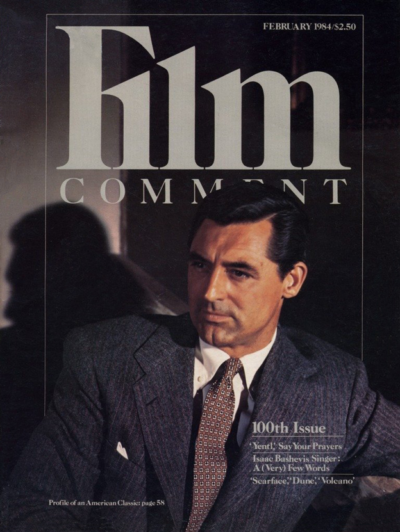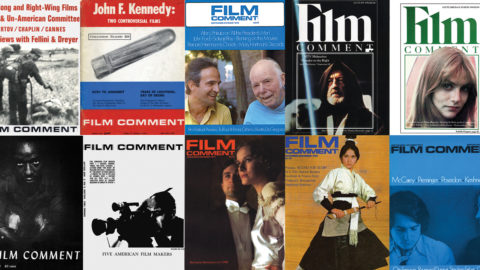THE 1983 MOVIE REVUE
1983 shuffled into history on anything but terms of endearment with its audience. Moviegoers made their Christmas Day with Clint Eastwood and his oversize Smith & Wesson, and precious little else. So David Chute asks 1984 to give us something more than “pure cinema.” Stephen Harvey casts a severe glance back at 1983’s movie newsmakers (includes six ten-best lists). A team of industry crystal-bailers tells Anne Thompson who’ll be nominated for Oscars next month. And in—we promise—our only invocation of George Orwell, Jamie Horwitz scans the software horizon for things to come.
INSIDE FILM COMMENT
Seems like only yesterday—if you’re Rip Van Winkle— that a buff periodical called Vision hit the stands. In fact, it was 1962. Since then, Vision has grown up (or at least grown older) to become FILM COMMENT. This is our 100th issue, and we are celebrating the centenary with a retrospective look at the magazine’s politics and policies. Cliff Froehlich interviewed founding editor Gordon Hitchens, the current editor, and publishers Clara Hoover, Austin Lamont, and Joanne Koch. He dug up some dirt and sheds a good deal of light on the struggle to put out a good magazine on a small budget. No, we did not edit out the warts. Yes, we do thank 21 years’ worth of readers for their interest and support.
HER ‘YENTL,’ AND HIS
A little song, a little dance, a little tightening of the pants. In Yentl, Barbra Streisand altered more than the haberdashery of Isaac Bashevis Singer’s 20-page fable; she updated the centuries-long story of Jewish assimilation. Marcia Pally discusses what is gained and lost in Jewish-American movies. And Harlan Jacobson talks with Singer, who is less than pleased at the uses to which his tale has been put.
CARY GRANT AT 80
How is it that Faberge never marketed an essence called “Cary Grant”? Hollywood bottled the stuff for 35 years, from This Is the Night in 1932 to Walk Don’t Run in 1966, and its manly romantic scent infused moviegoers and the romantic-comedy movie genre with its grace, elegance, and buoyancy. David Thomson pays tribute to the real Cary Grant, who turns 80 this month. Happy birthday, happier memories.
JOURNALS
In Mexico, two maverick directors are tackling two “unfilmable” novels. Lloyd Rose visits David (Eraser Man) Lynch on the mammoth Dune set; and Todd McCarthy watches John Huston guide Albert Finney Under the Volcano.
THE TIME MACHINE
From Citizen Kane to Marienbad and a host of zombie movies, the cinema has worked magically to transcend the boundaries of time. A provocative essay by Harlan Kennedy.
MICHAEL APTED
He domesticated John Belushi, transformed Sissy Spacek into Loretta Lynn, and now places William Hurt in the Gorky Park labyrinth. Dan Yakir interviews the British director.
DE PALMA’S ‘SCARFACE’
This updating of the 1932 gangster classic is unlikely to be liked by people who like Brian De Palma movies. Explanation within. By David Chute
TELEVISION: ‘OVERNIGHT’
NBC’s “news for smart people” is dead. Richard Corliss elegizes.
BOOKS: ‘ROLLING BREAKS’
Aljean Harmetz is The New York Times’ diagnostician of the industry. Harlan Jacobson is ours. He reviews her book.
INDEPENDENTS: DANCE FEVER
Derek Hart’s Backstage at the Kirov is a movie love letter to the Soviet ballet company. Nancy Vreeland reports on this detente documentary.
BACK PAGE: QUIZ #5
Can you unlock these secrets of those pictures? All you need is a skeleton key.





